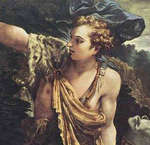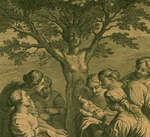
Adonis and Aphrodite
Adonis was one of only two mortals the goddess of love, Aphrodite, ever fell for (the other being Anchises, Aeneas’ father). And not only she loved him more gently and more profoundly than anyone before or since – be he a human or a god – she also loved him longer: from the first time she laid eyes upon him to the very last breath Adonis ever drew; some say, even longer than that. And this is the tale of that love: a myth explaining the cycle of the seasons, a narrative of life and death, a heartbreaking story of the origin of two flowers – the red rose and the anemone.
The Background
Cenchreis
Sometime before the birth of Adonis, his grandmother Cenchreis had made the fatal mistake of boasting that her daughter Myrrha was more beautiful than Aphrodite. The goddess didn’t like that one bit, so she punished Cenchreis in the most horrible way: she made her daughter fall in love with her husband, the Assyrian king Theias (although, others say that it was Cinyras, the king of Cyprus). Even though a goddess, Aphrodite couldn’t know back then that this sentence would set in motion a chain of events that would ultimately lead to the nastiest of her few heartbreaks.
Myrrha
One day, urged by consuming passion and with the help of her nurse, Myrrha sneaked into her father’s bed and made love to him in the dark. This went on for a couple of nights until Theias finally brought in a lamp to the room so that he might learn the identity of the young girl so desperately in love with him. Horrified by the discovery that she is none other than his daughter, Theias immediately raised his sword and tried to kill Myrrha, but she managed to escape at the last moment. She fled the palace and sorrowfully wandered through the world for many months. To make matters even worse, soon enough, she realized that she was pregnant. So, she started praying to the gods for salvation. It was a strange prayer: “O Gods,” she cried, “if you will listen to my prayer, I do not shun a dreadful punishment deserved; but now because my life offends the living, and dying I offend the dead, drive me from both conditions; change me, and refuse my flesh both life and death!”
The Birth of Adonis
The gods heard Myrrha’s prayers and found a creative way to grant them: they transformed her into a myrrh tree, and her tears momentarily turned into drops of myrrh. Just a few days later, a wild boar passed by the myrrh tree and ominously pierced its trunk with one of its tusks. Miraculously, this caused the tree to crack open, and Myrrha’s unborn baby fell down as a result; this baby-boy was none other than Adonis. The Naiads rushed forth to protect it; they laid him down on the soft leaves, and they anointed him with the tears of his own mother.
Aphrodite and Persephone
Loved by Two Goddesses
As irony would have it, Aphrodite happened to walk by this myrrh tree at this exact moment. Noticing the absence of a mother and the beautiful face of the baby boy, she decided to take it with herself. She secretly hid it in a chest and entrusted the chest to Persephone. Years passed, and Adonis grew into a handsome youth, more beautiful than any mortal ever beheld by human or divine eyes. And when the time came for Persephone to give Adonis back to Aphrodite – who was, by this moment, head over heels infatuated with Adonis – the Queen of the Underworld refused to do that.
Zeus’ Verdict
The two goddesses took their disagreement to Zeus. Not wishing to cause himself any problems, Zeus referred the dispute to Calliope, one of the Muses. Following her advice, Zeus decreed that Adonis should spend four months of the year in the Underworld, and four months with Aphrodite; the final four months of the year were left to his own decision. Wanting Adonis only for himself, Aphrodite was only partially happy with this verdict – as Calliope soon found out; namely, in the act of retribution, the goddess of love induced the Thracian women to kill Orpheus, Calliope’s son.
The Succession of the Seasons
Adonis loved Aphrodite almost as much as she loved him; unsurprisingly, every year he chose to spend his own four months with her. While the two lovers were together, the sun shone brightly and the soil was kind to the people, flowers bloomed and fruits ripened. Adonis’ disappearance could only mean that the time for the harvest of the crops had come; because, during the next four months, while the mortal slept in the embrace of Persephone, winter ruled the world and everything was dead and quiet.
Adonis and Aphrodite
Aphrodite, the Hunter
For two-thirds of the year, Adonis and Aphrodite were all but inseparable. Aphrodite was so smitten with this handsome mortal that she started neglecting not only Olympus and the heavens but also the care for her own sweet beauty. She became Adonis’ constant companion, roaming through the woods with him and cheering the hounds, her skirt kilted up to her knees in the manner of Artemis. However, as much as she learned to enjoy hunting harmless animals such as the hare or the deer, she kept away from the fierce wild beasts. “Dear boy,” she constantly advised her lover, “do not be rash, do not attack the wild beasts which are armed by nature, lest your glory may cost me great sorrow. Neither youth nor beauty nor the deeds which have moved Aphrodite have effect on lions, bristling boars, and on the eyes and tempers of wild beasts. Boars have the force of lightning in their curved tusks, and the rage of tawny lions is unlimited. I fear and hate them all.”
The Wild Boar
Unfortunately, Adonis didn’t take Aphrodite’s advice seriously. And one day, after his dogs had aroused a wild boar from its hiding place, Adonis pierced it with his spear. However, the boar countered fiercely: it raced after Adonis and sank its deadly tusk in the youth’s groin, stretching him dying on the yellow sand beneath his feet. Now, some say that, in order not to scare him, Aphrodite omitted one crucial detail while warning Adonis: namely, that her lover Ares could transform himself into wild beasts. Consequently, some authors believe that it was Ares who actually killed Adonis. Others claim that the wild boar was, in fact, sent by Artemis, avenging the death of Hippolytus. Yet a third group believes that there was no warning at all: Adonis simply refused to go back to the Underworld one year, and Persephone sent a wild boar to take him there for good.
The Red Rose and the Anemone
Aphrodite heard Adonis’ groans and rushed to her lover; but, unfortunately, she arrived just a tad too late. While running, she pricked her foot on a white rose and stained the flower with her blood; the rose turned red. It is said that this was the first red rose ever to appear on the earth; it stands for passionate love ever since then. The other flower associated with this story has somewhat darker symbolism. After blaming the merciless Fate for taking Adonis away from her, Aphrodite sprinkled the blood of Adonis with sweet-smelling nectar, and the former suddenly began to sparkle, “just as transparent bubbles always rise in rainy weather.” In less than an hour, a flower sprang up: it was dark red, the very color of Adonis’ blood. Named anemone (meaning: “windflower”), it is said that this flower symbolizes Aphrodite’s everlasting grief for Adonis, for just like him, it is beautiful, slender, and short-lived.
Adonis and Aphrodite Sources
The most famous retelling of the story of Adonis and Aphrodite can be found in the tenth book of The Metamorphoses; however, Ovid’s version doesn’t include the deal between Persephone and Aphrodite; you can read about it in Apollodorus’ Library.
See Also: Theias, Myrrha, Adonis, Aphrodite, Persephone, Cinyras
Adonis and Aphrodite Video
Link/Cite Adonis and Aphrodite Page
Written by: The Editors of GreekMythology.com. GreekMythology.com editors write, review and revise subject areas in which they have extensive knowledge based on their working experience or advanced studies.
For MLA style citation use: GreekMythology.com, The Editors of Website. "Adonis and Aphrodite". GreekMythology.com Website, 21 Nov. 2018, https://www.greekmythology.com/Myths/The_Myths/Adonis_and_Aphrodite/adonis_and_aphrodite.html. Accessed 19 April 2024.






